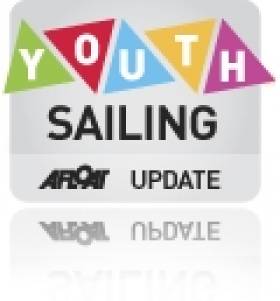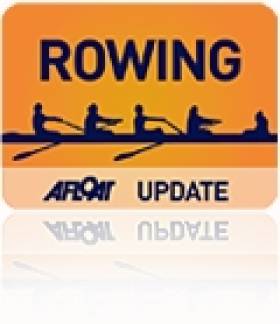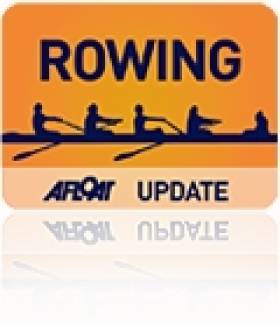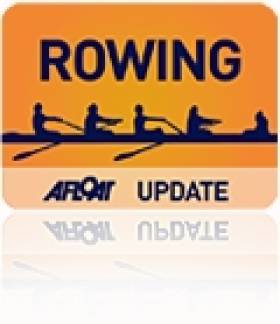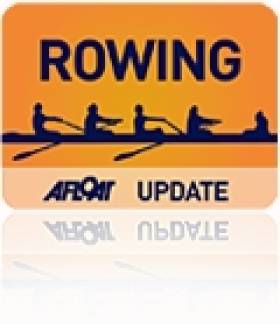Displaying items by tag: UCD,
UCD Lead Student World Yachting Cup
UCD Ireland Sailing Team currently sit atop the leader board in La Rochelle.
Following last nights "Night Race" and this mornings Windward /Leeward the team now lie 6 points clear of the second placed Canadian team.
The five and a half hour night race came down to three way match race over the last three miles, with the French and Australian teams pushing UCD all the way to finish in a fraught tacking duel.
The team, buoyed by huge support from at home, now have a maximum of 4 more races to go in the series and are in a strong position in what has proven to be an incredibly competitive fleet.
With plenty of racing left UCD Team Ireland still have a lot to do if they want to bring home the Gold.
Team Captain Cathal Leigh Doyle adds:
Every race has been a dog fight. No result comes easy and no result is ever secure until we literally get the whistle on the finish line! Working from today backwards:
Today, 10 knots and flat water. We nailed our start line and as our tactician had planned, we secured the left hand side of the beat and played the shifts to the windward mark. We rounded in first place with the French defenders behind us. Downwind we had to play defensively as the French tried everything the could do roll us. Once again, our training over the last few weeks showed with us out gybing the French and leading to at the leeward mark. At the leeward, we rounded in first, the French in second and the USA in third. As we have learned over and over again since we arrived here, twenty meters of separation between two boats means both boats are in TOTALLY different wind. The USA climbed over the French and over us. We tacked back to try defend but by then it was too late. We held on to secure second with a late comeback from Italy. Just to show you how variable is it here, the defenders went from second place to seventh in that race.
In the inshore, the race committee decided to send us for a 21 nautical mile race (After a 28 nautical mile last night we were not too impressed). The race was effectively a huge windward/leeward race course. The wind had increased to 15 knots and this wind range we have found all week that we excel. The right side was favoured because the tide had turned and would lift us up to the first mark. We went right and were in great shape behind once again the French. However, Canada, Italy and England banged right and gained huge distance. Once around the first mark, it was a procession to the finish line so we secured the 4th place. Everyone is tired and the bodies are beginning to really ache.
Yesterday, was a roller coaster! Three windward/leeward races and one offshore night race. Again in the 15 knots breeze we had the edge on the fleet. Again however, the USA and Canadians were giving us nothing for free. In our first race after getting buried on the start line Aidan flicked the boat through the smallest of gaps and got us into clear air and the right side of the beat. We worked had all the way around and finished 3rd. In the next two races, Aidan and Barry nailed the start! We dominated from the start and finished the race with bullets. Aidan and Simon on mainsheet are really finding the different modes for sailing these yachts and enabling us to carve our way upwind. Downwind Barry is calling some amazing lines and getting us clear lanes.
The offshore race was interesting to say the least. We brought in our subs Ben and Ellen and Theo, Simon and Bella got a break for the night. We started well rounding the first mark in 5th and Aidan and Barry planned to go very low for the 5k downwind. It paid and we rounded the next mark in 3rd. For the next 4 hours it was match racing between us and Australia, France and the USA! We crossed the line and the others crossed within 30 seconds behind us so you can imagine how close it was. 5 hours of racing and we only confirmed our result on the final tack. Aidan excelled driving in the dark and once again, our bow man had a great day on the water making sure we looked good and all our moves went smoothly.
Ok its time for team debrief here so I have to bounce. Two days left, 12 races done and only maximum of 15 in this series so only 3 left. We want to bring the cup home but there is still a lot of sailing to be done!
UCD Women's Senior Eight Wins Division One at Skibbereen Regatta
#ROWING: UCD won the Division One A Final of the women’s senior eight at at Skibbereen Regatta at the National Rowing Centre today, seeing off a strong challenge from NUIG. Queen’s University were similarly impressive in winning the Division One title of the men’s coxless four.
John Keohane of Lee Valley claimed a notable scalp when he won the Division One men’s single scull A Final, beating top junior Paul O’Donovan of the host club. Keohane said that the two men had matched each other down the course but that O’Donovan had had a very poor start.
UCD Rowers Fastest at Dublin Head of the River
ROWING: UCD’s men’s senior eight clocked 10 minutes 29 seconds in excellent conditions to claim the title of fastest crew at the Dublin Head of the River. Trinity took the Diane Cook trophy for best overall club.
Dublin Head of the River 2012 – Selected Results
Overall: 1 UCD senior eight 10 minutes 29 seconds, 2 St Michael’s sen eight 10:35, 3 Neptune, Carlow, Offaly sen eight 10:44, 4 Trinity intermediate eight 10:48, 5 UCD inter eight 11:00, 6 Trinity novice eight 11:05.
Pennants – Men, Eight – Senior: 1 UCD 10:29, 2 St Michael’s 10:35, 3 Neptune, Carlow, Offaly 10:44. Intermediate: 1 Trinity 10:48, 2 UCD 11:00, 3 Queen’s. Novice: 1 Trinity 11:05, 2 Queen’s 11:21, 3 Neptune 11:21. Junior: 1 Commercial 11:26, 2 Neptune 11:27, 3 Blackrock 12:29. Masters: 1 Commercial 11:24. Fours, coxed – Senior: Commercial 13:01.
Women, Eight – Senior: 1 St Michael’s, University of Limerick 12:05, 2 Queen’s 12:21, 3 UCD. Intermediate: 1 Trinity 12:14, 2 UCD 12:41, 3 Commercial 13:05. Novice/Junior: Shannon 13:29.
UCD Rowers Show Their True Colours
ROWING: UCD took three of the four titles on offer at a lively set of Colours Races in Dublin today. Trinity’s novice women denied the college a second consecutive clean sweep in perfect conditions.
In the men’s senior race, the Gannon Cup, Trinity took a surprise early lead. The bigger UCD eight reeled them in and as the crews passed the Four Courts, UCD had taken a lead they were not to lose. This gave Turlough Hughes of UCD a win over his twin brother Patrick, who rowed for Trinity.
The Corcoran Cup for senior women saw UCD lead all the way, though Trinity exerted serious pressure in the closing stages.
The two novice races were notable for different reasons. In the men’s race, UCD got off to an astounding start and won much as they liked. The women’s was the best contest of the day. Leaders UCD could not hold off the late surge of Trinity, who won by over a length.
Colours Races 2012
Senior Men (Gannon Cup): UCD bt Trinity 1l
Novice Men (Dan Quinn Shield): UCD bt Trinity distance
Senior Women (Corcoran Cup): UCD bt Trinity 1¼ l
Novice Women: Trinity bt UCD 1¼ l
Rowing Twins Take Each Other On in Gannon Cup
Twin brothers Turlough and Patrick Hughes (20) will vie for dominance in the Gannon Cup, the annual colours race between Trinity and UCD, on the Liffey on Bank Holiday Monday. UCD, who will be seeking their fifth consecutive Gannon, will be stroked by Turlough Hughes, while Patrick will be in the five seat in the Trinity boat. UCD’s Dave Neale will be seeking his fifth Gannon Cup title.
Trinity’s women’s eight, winner of two of the last three Corcoran Cups, have experience in their crew for Monday. Sinead Rodger and Keira Buttanshaw compete in their second Corcoran Cup; Susannah Cass her third and Caitlin Condon, an American, her fourth. UCD Ladies Boat Club have yet to announce their crew.
Mark Pollock, the adventurer who competed in the Gannon in 1995, 1996 and 1997 – and won all three - will be the guest of honour at the event. Pollock has shown tremendous fortitude in taking on blindness and then, separately, paralysis sustained in a fall.
Men’s Senior Eight (Gannon Cup)
UCD: Vincent Manning, Emmett Feeley, Simon Craven, Conor Walsh, Gearoid Duane, Dave Neale, Finbar Manning, Turlough Hughes; cox: Hannah Fenlon.
Trinity: P Mannix, AJ Rawlinson, Will Hurley, Charlie Landale, Patrick Hughes, Paul Flaherty, Ian Kelly, Danny Ryan; cox: Maeve Crockett.
Women’s Senior Eight (Corcoran Cup)
Trinity: Rebecca Dowling, Sinead Rodger, Keira Buttanshaw, Suzanne Daniels, Susannah Cass, Rebecca Deasy, Caitlin Condon, Ruth Morris; cox: Naomi O’Sullivan.
Monday’s Programme: 8:30 Sally Moorhead Trophy (Novice Women). 9:00 Dan Quinn Shield (Novice Men). 9:30 Corcoran Cup (Senior Women). 10:00 Gannon Cup (Senior Men)


























